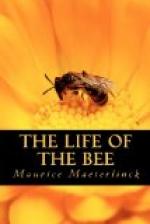“Tantus amor florum, et generandi gloria mellis!”
cries Virgil in the fourth book of the Georgics, wherein he devotes himself to the bees, and hands down to us the charming errors of the ancients, who looked on nature with eyes still dazzled by the presence of imaginary gods.
[20]
Why do they thus renounce sleep, the delights of honey and. love, and the exquisite leisure enjoyed, for instance, by their winged brother, the butterfly? Why will they not live as he lives? It is not hunger that urges them on. Two or three flowers suffice for their nourishment, and in one hour they will visit two or three hundred, to collect a treasure whose sweetness they never will taste. Why all this toil and distress, and whence comes this mighty assurance? Is it so certain, then, that the new generation whereunto you offer your lives will merit the sacrifice; will be more beautiful, happier, will do something you have not done? Your aim is clear to us, clearer far than our own; you desire to live, as long as the world itself, in those that come after; but what can the aim be of this great aim; what the mission of this existence eternally renewed?
And yet may it not be that these questions are idle, and we who are putting them to you mere childish dreamers, hedged round with error and doubt? And, indeed, had successive evolutions installed you all-powerful and supremely happy; had you gained the last heights, whence at length you ruled over nature’s laws; nay, were you immortal goddesses, we still should be asking you what your desires might be, your ideas of progress; still wondering where you imagined that at last you would rest and declare your wishes fulfilled. We are so made that nothing contents us; that we can regard no single thing as having its aim self-contained, as simply existing, with no thought beyond existence. Has there been, to this day, one god out of all the multitude man has conceived, from the vulgarest to the most thoughtful, of whom it has not been required that he shall be active and stirring, that he shall create countless beings and things, and have myriad aims outside himself? And will the time ever come when we shall be resigned for a few hours tranquilly to represent in this world an interesting form of material activity; and then, our few hours over, to assume, without surprise and without regret, that other form which is the unconscious, the unknown, the slumbering, and the eternal?
[21]
But we are forgetting the hive wherein the swarming bees have begun to lose patience, the hive whose black and vibrating waves are bubbling and overflowing, like a brazen cup beneath an ardent sun. It is noon; and the heat so great that the assembled trees would seem almost to hold back their leaves, as a man holds his breath before something very tender but very grave. The bees give their honey and sweet-smelling wax to the man who attends them; but more precious gift still is their summoning him to




